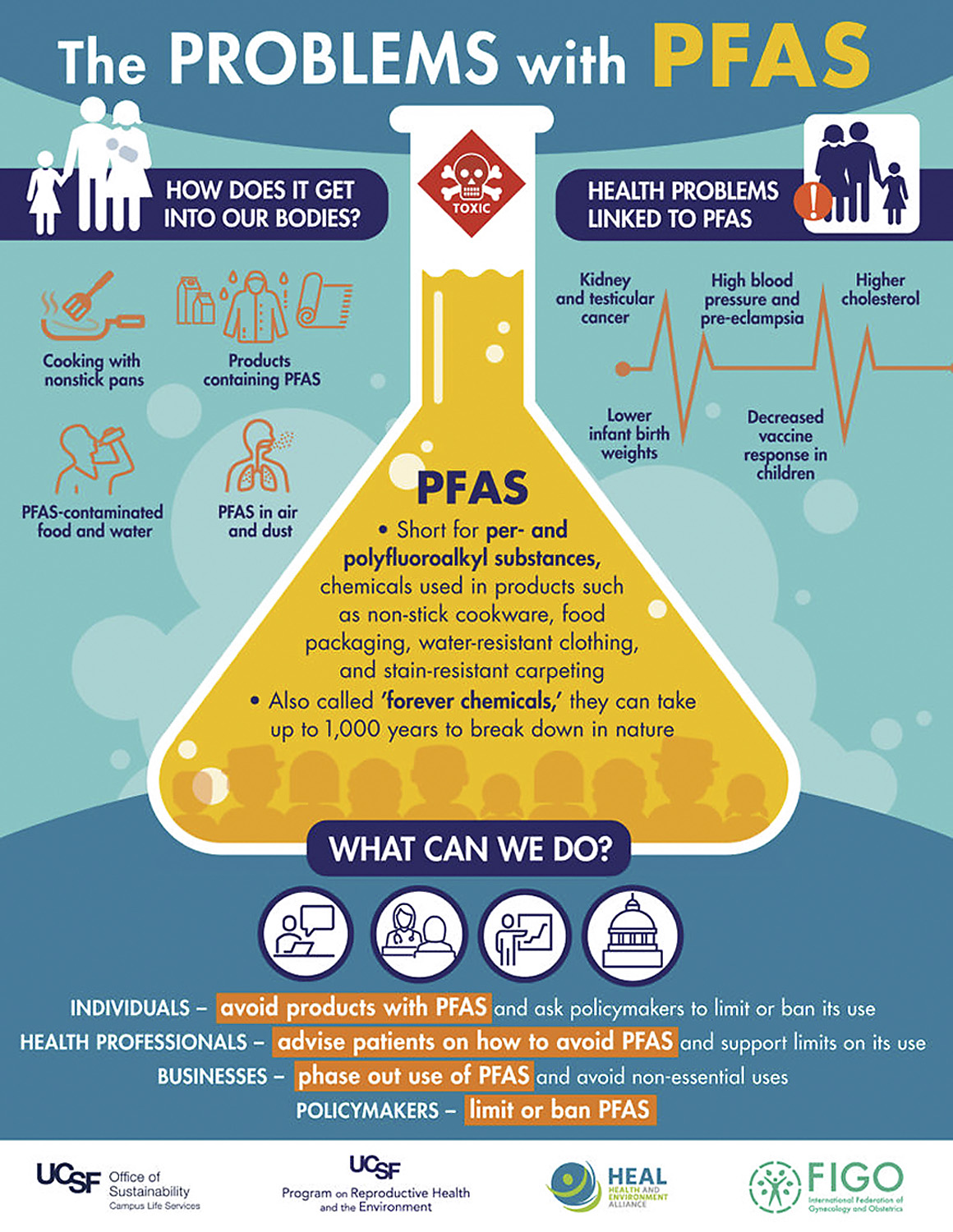MAVERICK CITIZEN
Polyfluoroalkyl chemicals contaminate our food, clothes, environment and even bloodstream — tight regulations must be implemented

Can we as consumers avoid PFAS in South Africa? Only if the companies that use them are transparent about their presence.
To recap, this is what we know.
In Part 1 of this series, we summarised some of the key ways that PFAS (Per- and polyfluoroalkyl substances) are harmful and that humans can be exposed to these chemicals. This includes food that is packaged in PFAS-containing material or grown in PFAS-contaminated soil, commercial household products (including non-stick products, stain- and water-repellent fabrics), workplace exposure to the chemicals, drinking water that is contaminated, and eating animals and fish that are contaminated.
Part 2 showed that PFAS are present in multiple water bodies in South Africa, but that there is little agreement on where these come from, and no companies are currently taking responsibility.
Part 3 showed that the international and state regulatory process for prohibiting the use and production of PFAS is moving too slowly. The Stockholm Convention currently only regulates two PFAS – PFOA (perfluorooctanoic acid) and PFOS (perfluorooctanesulfonic acid) — out of a class of some 4,000 chemicals which means that companies can go on producing the other 3,998, and can even make some new ones, without regulation.
In Part 4, Daily Maverick showed that this means that the South African government’s new efforts to protect us from these forever chemicals only really tries to limit the same two PFAS, and the regulations don’t place any positive duty on the government to seek out the users and producers of these chemicals to make sure that they’re even complying. So, they don’t go far enough. Essentially, if PFAS keep being produced, it is difficult for us to avoid exposure.
This is a problem on every continent, which might be why studies have shown that most people in the United States have been exposed to PFAS and have PFAS in their blood, that a range of PFAS was detected in the blood of European citizens across the EU, that PFAS were found in the blood of the Chinese population as a result of their presence in Chinese drinking water, most people in Australia have measurable amounts of PFAS in their blood due to exposure from multiple sources including firefighting foams … I could go on, but I think you get the point.
The approach of trying to regulate these chemicals one by one is not working, and places us all — and the next generation — at risk. Globally this has already begun to be recognised. This May, the International Federation of Gynaecology and Obstetrics issued an opinion calling for PFAS chemicals to be restricted around the globe due to the impact of these chemicals on pregnant women, foetal development, and newborns. The EU’s chemicals strategy for sustainability promises a comprehensive action plan to address PFAS, including phasing them out of consumer products.
Until they are banned for good, it’s difficult for us as citizens to control whether companies are pumping PFAS into the water or exposing us unnecessarily. But we do have some control over the products that we buy.
Don’t we?

Teflon, first invented by the Du Pont company, is commonly used on non-stick pans, despite the evidence that these chemicals are harmful to human health. (Photo: thoughtco.com / Wikipedia)
Since beginning the research for this series, this journalist has been browsing the stores, searching for any sign that would help me make an informed decision not to buy PFAS-containing products. Getting rid of my old Teflon-coated pans was an easy first step. Eating food that was cooked at home, rather than choosing takeaway wraps, burgers or pizzas in disposable containers is another way to limit exposure (even when they’re advertised as ‘biodegradable’ or ‘compostable’, it’s no guarantee that they don’t contain PFAS according to a 2021 study).
But trying to understand what does and doesn’t contain PFAS in an ordinary grocery store is much more difficult. Most companies don’t tell you what’s in their products that make them non-stick or greaseproof, probably because there is no legal or regulatory requirement to do so. A casual browse of the baking or food packaging aisle, cosmetics section, or even of the carpet and clothing store will not give you much information at all.
For example, microwave popcorn is a well-known source of PFAS, with one study showing that regular consumers of microwave popcorn had levels of PFAS in their blood that were 63 times higher than the average. Not one microwave popcorn box I looked at in stores in June 2021 warned me of any risk.
Similarly, a June 2021 study found the presence of PFAS in over 100 cosmetics products — more than three-quarters of waterproof mascara, two-thirds of foundations and liquid lipsticks, and more than half of eye and lip products had high fluorine levels suggesting the presence of PFAS. However, most of these did not list PFAS on the label, and I challenge you, dear reader, to find one that does here in SA. Another study showed the presence of PFAS in some dental floss, but there is no mention of this on any of the dental floss brands I picked up.
There are a few high-end home and health brand websites that do go a bit further. Yuppiechef have a few frying pans that are labelled ‘PFAS free’ and other baking and cooking supplies that specify that they’re ‘PTFE free’. Faithful to Nature has baking paper and sponge cloths that are ‘fluorochemical free.’ But most South Africans are not shopping exclusively at these stores. They are shopping for their groceries, cookware, and food at one of our big retailers.
Daily Maverick approached Woolworths, Pick n Pay, Spar, Shoprite, Food Lovers Market, and Massmart to ask them whether the goods they are selling us are safe. No response was received from Spar, and The Consumer Goods Council of South Africa also did not respond to a request for comment.
A summary of the responses from other retailers:
Woolworths: Feroz Koor, Group Head of Sustainability
“Woolworths is committed to ensuring the highest standards of food safety and quality. We prohibit the use of PFAS chemicals in our food packaging. We have had a Material Chemicals Policy in place for 10 years, guiding our teams and suppliers based on the standards and legislation regulating these chemicals in South Africa, the European Union and the USA.
“Historically PFAS chemicals were commonly added to grease resistant papers and boards in food packaging. Our suppliers of these packaging items ensure that the packaging they supply meets our minimum requirements as set out in our policy document, which includes a prohibition on the use of PFAS chemicals.
“All our Woolworths food suppliers are audited regularly and provide declarations stating that the packaging materials and articles covered by all the relevant regulations comply with the rules applicable to them.
“While there is no regulation in South Africa, we prohibit our suppliers from supplying foods packaging that contain PFAS and PFOS chemicals.
“To ensure there are no harmful chemicals (PFOA and PFOS) present in our coating, our products are being tested by a third-party laboratory and conform to European regulations (EC1935 & regulation EU 2019/1021) standard.”
Pick n Pay: Andre Nel, General Manager Sustainability
“Our teams have investigated the presence of PFAS in our PnP branded products and we are pleased to confirm that none of our own Brand products contain them. As you will know, Own Brand includes No Name and PnP branded products in our stores.
“We do not have data on corporate branded suppliers with respect to PFAS, but would recommend that you contact the manufacturers concerned for more detail on their products.”
Shoprite: The Shoprite Media Team
“The Shoprite Group is liaising with the Consumer Goods Council of South Africa (CGCSA), who as the consumer goods industry body, is engaging retailers, manufacturers, and the relevant national departments to coordinate an industry-wide approach.”
Food Lovers Market:
“Thank you for your query and for allowing us to provide you with our feedback. We are always open to learning about — and implementing — measures to ensure the protection of our customers, suppliers and colleagues. We also take guidance on harmful substances which may be present in foodstuff we produce and sell, and this is regularly obtained from the Consumer Goods Council of South Africa.
“On investigation, we can confirm that, of the six substances listed as part of the Regulations to Prohibit the Production, Distribution, Import, Export, Sale and Use of Persistent Organic Pollutants, only one — Periluoroctanoicacid (PFOA) — has specific bearing on our retail environment.
“Our packaging team is aware of the new regulations and have implemented checks to monitor and ensure that the substance in question is not present in any product in our stores going forward.
“Please be assured that we are constantly looking at ways to offer our customers a safer and more sustainable, earth-friendly shopping experience through our sustainability journey.”
Massmart: Alexander Haw, Group Sustainability Executive
“We have engaged with both our Product Safety and Food Safety leads to get their input and perspectives about our approach to PFAS. Given their ubiquity of use and the number of chemicals classed as PFAS, this represents a complex subject that encompasses the retail sector in its entirety.
“We are in the initial process of conducting a review to identify PFAS in our Private Brand products with a view to implement remedial actions that might be required.”

(Photo: Heal Health and Environment Alliance)
While some responses provide little comfort, others suggest that reducing the presence and exposure of PFAS is on the agenda, albeit only recently. Although Daily Maverick asked each of the retailers whether they had alerted consumers to possible PFAS risks, none of them responded to this question directly.
There is currently no legal duty on retailers to disclose whether their products contain PFAS, or were manufactured using technology that involved them (like those dairy milks I mentioned in Part 2). There is currently no industry-wide strategy to phase them out or eliminate their use.
While industry may baulk at the banning of the use of all PFAS in one step, some researchers have suggested a phased approach to getting these products off our shelves. A 2019 study in the Journal of Environmental Science suggests sorting all PFAS into three categories — non-essential, substitutable, and essential.
Anything non-essential, such as the presence of perfluorodecalin in cosmetics, should be phased out or banned (here’s a guide to check if your cosmetics have this chemical). In the second category, where there is an alternative or substitute already available, PFAS use can be phased out and banned. An example would be the use of PTFE membranes on waterproof jackets. Finally, where PFAS is currently used for essential use, more time, energy and money are needed to go into research and development for alternatives. And fast.
For now, we as consumers remain in the dark, possibly buying products and food that can harm us without ever knowing. The companies that sell it to us do not legally have to take responsibility. Our duty as consumers, then, cannot be to simply ‘shop better’.
Consumers must make their voices heard in government, and demand better regulation that is proactive, enforced, and developed not only by the Department of Forestry, Fisheries, and the Environment but by a multi-departmental team (Health, Trade, Industry and Competition, Science and Technology, etc.)
If we don’t act soon, these forever chemicals could very well be around forever. DM





















 Become an Insider
Become an Insider
Research on this PFAS is not conclusive. The best I could find is that this chemical ‘may’ be detrimental to human health (FDA). In the 80’s there was a big international public outcry against a certain type of sheep dip after the active substance was found in lip stick.
Research afterward led to the conclusion that someone must apply 3 tons of lipstick before some damage may be caused. Please do not cry wolf before the facts are not known.